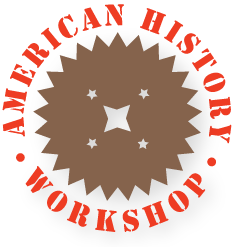Who We Are
American History Workshop is a consortium of historians, writers, designers, and filmmakers who enliven public understanding of our people’s history. We began in 1980 with the goal of insuring that interpretive exhibits and presentations reflect new currents of historical research, thematic development, and sound pedagogical practice. Since then, our services have been expanded to include audience analysis, exhibit planning and design, media planning and production, fund raising assistance, and organizational development.
The interpretive arts – story-telling, theater, exhibitry – connect people to ideas and images that enrich their lives. When the subject matter is historical, interpretation ought to let people understand that the traditions of space, time, objects, and social processes are alive in their own minds. History isn’t told so that minds can be furnished with the places, names and dates of battles, but rather to learn how modern life is rooted in the past. The history we tell is an honest one, unvarnished by boosterism or by nostalgia for a doubtfully golden age. We strive to locate and depict the human issues – the passions and the actions – of each generation of Americans that speak most forcefully to our own age. We especially want to recover the forgotten voices in the American past, and to show that life in the most ordinary circumstances and the most local places can be connected to the larger stories of the American people.
The American History Workshop produces public programs to connect Americans with their past. Among our clients are museums, historical societies, historic districts, parks and gardens, filmmakers, public agencies, businesses, citizens’ groups, television stations, and others involved in interpreting history.
We produce: full development plans for young or growing museums; collections management and public programs evaluations; scripts, design and technical production of multi-media presentations; interpretive exhibits and educational programs; evaluations of public programs; guide books, catalogues, local histories and other publications; and historical research reports in American politics and society, business and labor, families and communities, ethnic groups, cities and regions, and the development of art and architecture.
Point of View
The interpretive arts — story-telling, theater, exhibitry — connect people to ideas and images that enrich their lives. When the subject matter is historical, interpretation ought to let people understand that the traditions of space, time, objects, and social processes are alive in their own minds. History isn’t told so that minds can be furnished with the places, names and dates of battles; it is told so that we can learn how modern life is rooted in the past. The history we tell is an honest one, unvarnished by boosterism or by nostalgia for a doubtfully golden age. We strive to locate and depict the human issues — the passions and the actions — of each generation of Americans that speak most forcefully to our own age. We especially want to recover the forgotten voices in the American past, and to show that life in the most ordinary circumstances and the most local places can be connected to the larger stories of the American people.
The Work Process
We are often called when an organization has seen the possibility for growth, or when it wants to connect itself more strongly to its community of visitors, viewers, or supporters. Moments like these are important occasions in the histories of organizations, and they often result in innovative work, new methods of inquiry, and new modes of interpretation.
We begin each project by assembling members of our staff, scholars, and technical consultants whose skills and experience particularly qualify us to understand the challenges of the work. The client’s own leadership is essential to the collaborative process — we do not wish to duplicate skills the institution already has, but rather to form a capable task force to define problems and solutions, and shape programs that can be funded, built, and maintained within the resources of the institution.
American History Workshop projects always include a plan for proceeding — if the scope of our collaborative work does not include day-to-day involvement to the completion of the program, we leave the organization with a clear idea of what it can do the next week, and the next month, to make the vision real.

